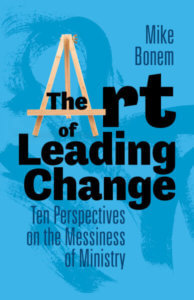Mike Bonem says that healthy organizational change will not occur unless a leader is willing to reflect, learn, and grow. To lead well, you must have the courage to allow yourself to be changed.
Whether you are a young or an experienced leader, you have made a considerable “investment” in your leadership. That investment includes formal education and training, time spent learning from mentors and other wise leaders, lessons from previous ministry experiences, and more. But what if some of the development that brought you to this point will not serve you well going forward? Are you willing to admit that you need to change and do the hard work of unlearning old habits and assumptions and approaches so that you can develop the new ones you will need?
The courage to change precedes all of the other kinds of courage for change. Healthy organizational change will not occur unless you are willing to reflect and learn and grow and, in doing so, to change yourself. To lead well, you must have courage to be changed.
The courage to not know
One of the hardest phrases for a leader to utter is “I don’t know.” This is especially true for pastors, whose formal training prepares them to know the answers to complex theological questions. Think of any of the bigger challenges facing your church or ministry. If the solutions were obvious, you’d already be implementing them. This reality puts leaders in the position of not knowing the best path forward. And for leaders who pride themselves on being able to answer every question, this is a very uncomfortable place to be. But if you want to master the art of leading change, you need to have the courage to say “I don’t know” and “I need help.”
The courage to invite differing opinions
Saying “I don’t know” is done most easily in a cozy gathering with a few trusted friends. But pastors and ministry leaders may need to voice those words in larger gatherings that include people who are skeptical or critical of them. That takes courage. It takes even more courage to reach out to these less-than-supportive individuals, seeking their input or inviting them to be part of a leadership team. Think of two or three people whom you are reluctant to invite into a leadership position, despite the fact that they have clear leadership gifts. If your reluctance is just because they see thing differently or ask a lot of questions, they may be exactly the people who need to be in the leadership circle. Having these people in leadership roles may result in better decisions and broader congregational support.
The courage to fail
Many leaders, and the people they lead, operate from a risk avoidance perspective. They want a sure bet. They may give lip service to a notion such as “failing forward,” but then they quickly ask about a proposed change, “Will this succeed?” Victory is never assured when leading significant organizational change. Therefore, the courage to fail is an essential attribute for change leaders.
The courage to persevere
Too many change efforts have failed because of a lack of perseverance. Organizational transformation is a slow process with many twists and turns. It takes courage to persevere when a critic seizes on the moment to proclaim, “I told you this idea wasn’t going to work.” Or even worse, “I told you this leader wasn’t going to work.” It takes courage to press ahead when supporters abandon their commitment to a task or worse, their commitment to you. This is not to say that leaders should press ahead with every change effort, regardless of opposition, warning signs, and disappointing results. The art of leading change involves distinguishing between an experiment that isn’t going to work and an initiative that needs a little more time and effort.
The courage to leave
An office building may have a universal key that fits all locks, but a “universal leader” exists only in myths. Leaders are called to a specific role and context. Said another way, your gifts may be just what a church needs in one season but not in the next one. Some leaders get so comfortable in a context that they miss the Spirit’s promptings. Leaders should not expect their tenures to be short, but they should be willing to leave when they sense, after discerning with the help of the Spirit, they are no longer the right person for the role.
The courage to lead
Are leaders born or made? The question has been asked for years, and my answer is “Yes, both.” Some people are born with incredible leadership gifts that are evident before they reach adulthood. Others are not “born” leaders, but they grow into significant leadership roles through training and experience and reflection. And, of course, Scripture is clear that the Spirit gives the gift of leadership to some. Regardless of whether a leader is born or made, the act of leadership requires courage.
Wherever you are, if you find yourself gripped by fear as you step toward leadership, remember the words of God to one anxious leader: “Be strong and courageous. Do not be afraid; do not be discouraged, for the Lord you God will be with you wherever you go” (Josh 1:9).
 From The Art of Leading Change: Ten Perspectives on the Messiness of Ministry by Mike Bonem. Copyright © 2022 Fortress Press. Reproduced by permission. The book is available at Fortress Press, Cokesbury, and Amazon.
From The Art of Leading Change: Ten Perspectives on the Messiness of Ministry by Mike Bonem. Copyright © 2022 Fortress Press. Reproduced by permission. The book is available at Fortress Press, Cokesbury, and Amazon.
Related Resources
- The Messy Art of Leading Change by Mike Bonem — Podcast episode | Podcast video | In-depth interview
- The Risk of Trying to Please Everyone by Mike Bonem
- Genuine Change Involves Continuity by Doug Powe and Lovett H. Weems Jr.
If you would like to share this article in your newsletter or other publication, please review our reprint guidelines.






